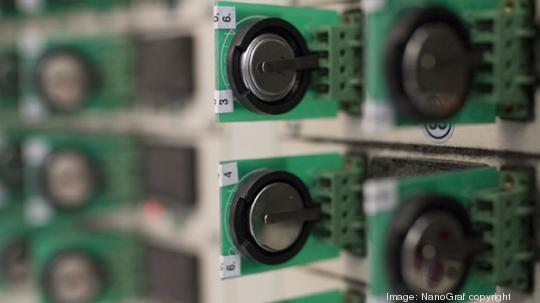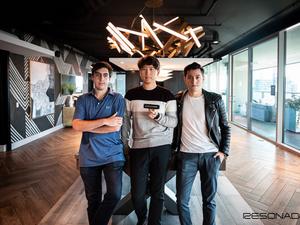
NanoGraf Corp. has been awarded a contract from the U.S. Government to develop what will be the first large-volume manufacturing facility in the U.S. for silicon anode, a key component in batteries, including those that power electric vehicles.
The 17,000-square-foot facility at 400 N. Noble St. in Fulton Market will be the site of NanoGraf’s new corporate headquarters and has 11,000 square feet for labs and production space. The facility is currently under construction and is expected to be completed by the end of the first quarter or early second quarter 2023.
At peak production, NanoGraf’s facility will produce 35 metric tons per year, which is enough material to provide enhanced power for various battery applications.
“That’s enough for about 20 million battery cells per year,” Connor Hund, chief operating office for NanoGraf, told Chicago Inno.
The Northwestern University spinout has developed a good relationship with the Department of Defense over the years in its continual development of stronger lithium-ion batteries. NanoGraf won a $1 million development contract from the Department of Defense in March to create a longer-lasting battery for the Army. The batteries are used to improve the communication equipment used by soldiers in the field. In 2020, the company also received a $1.65 million grant from the DoD.
Just one month ago, NanoGraf announced its most energy-dense lithium-ion battery cell to date.
“The DoD has been instrumental in supporting our company over the last couple of years in terms of development dollars and more R&D dollars at the battery cell level, and now they’re supporting us on manufacturing scale up,” Hund said.
Hund added that it's been a national strategic priority by the DoD to have critical materials that are being used on soldiers and going into equipment like night-vision goggles manufactured with domestic components, thereby reducing supply chain risk.
Although NanoGraf has been focused on applications for its batteries to be used by the Army, Hund sees electric vehicle battery production as a logical next step. The company has started doing more joint development work in the space, but he couldn’t comment on which companies they are working with specifically.
“You’ve had traditional automakers in the Detroit area, you have clean tech companies mostly on the coasts, and I think there’s a great opportunity to merge that in Illinois," he said. "Rivian is obviously the best example, but there’s a number of companies across the value chain that are part of that.”
A local production facility for one of the key components that power electric vehicles could have massive implications for the rest of the country as it addresses the battery market demand and supply chain challenges by onshoring the battery supply chain in the U.S. and in the heart of the Midwest.
U.S. Sen. Richard Durbin, D-Ill., said in a news release that the production of lightweight, energy-dense batteries may define the next generation of consumer and military vehicles and shows that Illinois is poised to “become a leader” in the electric vehicle revolution.






